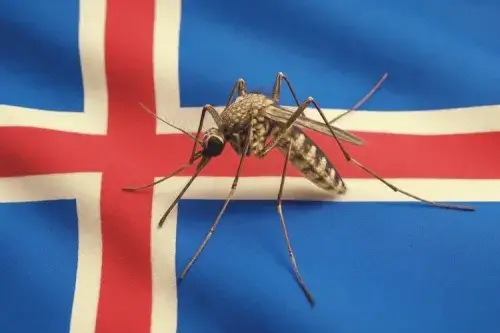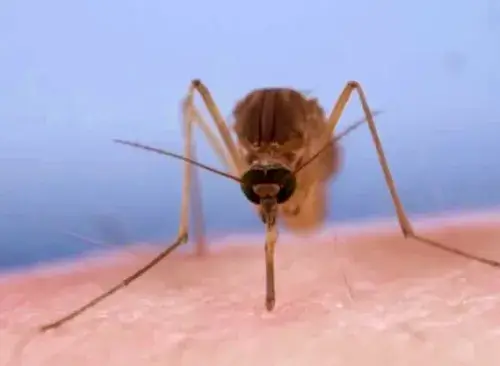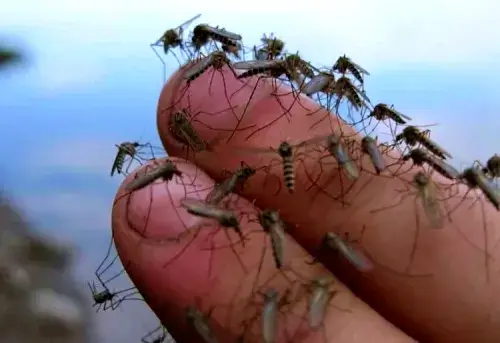Without Mosquitoes. Imagine a place where you can enjoy the serenity of nature, admire vast lakes, and leave your windows wide open on a warm summer’s evening without the annoying buzz of a mosquito.
This isn’t a fantasy it’s Iceland, the one place on Earth where these pesky insects have failed to establish a foothold.
While neighboring Norway, Scotland, and even the frigid lands of Greenland are teeming with mosquitoes, this island in the North Atlantic remains a sanctuary from their incessant bites and high-pitched whine.
Without Mosquitoes, question is, why?
It’s important to note that mosquitoes also don’t exist in Antarctica, but that icy continent hardly fits the description of a country where one can comfortably vacation. So, what is it about Iceland that keeps them away?
Why Iceland Is a Mosquito-Free Zone.
The lack of mosquitoes in Iceland isn’t due to some supernatural barrier or their inability to “find the way.” Instead, it’s a testament to how nature itself has put up an impassable defense.
The island is separated from the mainland by hundreds of miles of ocean, a vast watery expanse that mosquitoes simply cannot cross.
However, some mosquitoes do manage to hitch a ride on planes and arrive in Iceland. But even these accidental travelers are unable to establish a permanent presence.
You might think the conditions are ripe for them to thrive, with plenty of ponds, bogs, and stagnant water sources near airports the very places that serve as nurseries for mosquito larvae in other parts of the world.
Yet, the Icelandic climate provides a harsh and unforgiving reality check.
The mosquitoes’ main enemy here isn’t just the cold, but a constant cycle of freezing and thawing that occurs during the spring and autumn. This perpetual “reset” of the environment prevents eggs and larvae from ever developing into full-fledged adults.
In warmer climates, larvae can comfortably survive the winter in ponds or hidden crevices, and in places like northern Canada, eggs can remain dormant under the ice for months. But in Iceland, the weather is erratic and unpredictable.
Just as the larvae begin to develop, the water freezes again, and the process is cut short. It’s a never-ending cycle of false starts that the mosquitoes simply cannot endure.
Even the island’s famous geothermal hot springs, which don’t freeze in the winter, are no safe haven. The water is too hot, and its chemical composition is too far removed from the freshwater environment mosquitoes need to breed.
This means that even if a stray mosquito were to try and start a family in an Icelandic hot spring, its efforts would be completely futile.
Will Mosquitoes Ever Arrive in Iceland?
Scientists warn that the mosquitoes’ luck might eventually change. Due to climate change, springs and autumns are becoming warmer and longer, creating extended periods of unfrozen water.
If this trend continues, Iceland could be at risk of following the path of Hawaii, which was once mosquito-free but now suffers from their overwhelming presence.
Fortunately, dangerous tropical species won’t be able to survive here, as the island is still too cold for them. But who knows, maybe decades from now, Icelanders will hear that familiar, high-pitched buzz for the very first time.
The Secret Life of Mosquitoes.
Why They Bite Us.
The world is home to over 3,600 species of mosquitoes, and surprisingly, not all of them require human blood to survive. However, for a particular species known as the “house mosquito,” or Culex pipiens, human blood is an absolute necessity for reproduction.
It’s crucial to remember that only female mosquitoes bite. Male mosquitoes live their entire lives on a diet of flower nectar.
Female mosquitoes also drink nectar for energy, but the protein it contains is insufficient for the development of the eggs they need to continue their species.
This is why they seek out a blood meal from humans and other mammals our blood is incredibly rich in protein. So, it’s not just us who suffer from their bites, but also our furry friends like dogs, cats, and cows.
The proteins in our blood are digested inside the female mosquito’s body and converted into amino acids. These amino acids are essential for egg production.
After a female mosquito has found a victim and had her blood meal, she waits 2-3 days for the eggs to mature before laying them on the surface of water.
After this, most females die, but those who survive can continue to bother us with their buzzing and biting. They don’t need to mate again because they retain enough sperm from their first encounter to continue laying eggs.
Do Mosquitoes Have a “Type”?
It is believed that mosquitoes can detect a person’s scent from up to 30 meters away. They don’t bite indiscriminately; they have a distinct preference.
According to the publication Lifehack, mosquitoes are most attracted to people with Type O blood. In fact, they are said to bite people with Type O blood twice as often as those with Type A blood. This suggests that in many cases, we are the ones who make ourselves more appealing to them.
Mosquitoes are also highly attracted to the lactic acid on our skin, which is produced in large quantities after consuming dairy products, soy, and pickled vegetables.
While it may be hard to believe, these tiny insects have had a massive impact on human history, shaping the destinies of entire empires.
Some scientists even believe that mosquitoes, throughout history, may have been responsible for nearly half of all human deaths.
According to statistics, between 1980 and 2010, malaria a disease carried by mosquitoes killed between 1.2 million and 2.78 million people every year. It’s fair to say that malaria has claimed more lives than any other disease in history.
Have a Great Day!





